Review: Kung Fu Panda
The fifteenth day of the Chinese New Year marks the first full moon of the new lunar year, symbolic of the beginning of the rest of the year, and it is a time for families to reunite and appreciate what we have. How better to kick off a movie blog than on this day, with a review of a movie from the past year that not only celebrates Chinese culture, but should have been far more appreciated by movie lovers than it was?
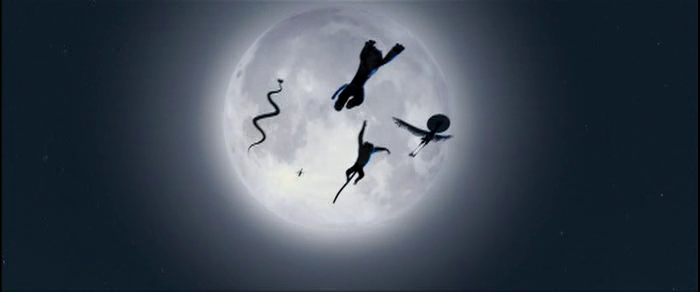
Last week, Kung Fu Panda received an undeserved drubbing for sweeping the 36th Annie Awards, largely because it was competing with WALL·E, which has become the pre-ordained “must love” animated flick of 2008 since it was released in the summer to critical adulation. I’m not convinced. Sure, WALL·E showed courage in dishing out Hello, Dolly! songs, a post-apocalyptic landscape, a rusty leading robot, a pet cockroach, and minimal dialogue in its first twenty minutes. But Kung Fu Panda opens just as superbly, with a gorgeously hand-drawn animated sequence and some smart counterpoint narration which are less self-consciously “courageous”. It also sustains its unflagging pace and energy, and never sacrifices its emotional and character complexity for the sake of ambitious plot turns and situations—a misstep that I feel WALL·E commits, especially as the narrative swerves aboard the AXIOM spaceship.
But that is fodder for a future post, and here I shall instead concentrate on all that is joyful (and at times disappointing) about Kung Fu Panda. If you’ve watched it, how did you feel about it? If you agree with me, or think I’m full of it, please do tell me in the comments.
Review: Kung Fu Panda
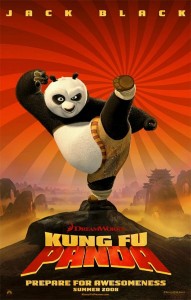 Kung Fu Panda is the kind of working title we’d expect from studio executives hoping to stretch a one-note high concept into a full-length feature. It doesn’t help that the movie bears the usual marks of a stodgy DreamWorks animation: 1) a roundup of celebrity “voice actors” who have been corralled more for their marquee names than for their vocal expressiveness; 2) a trailer with its dreadful abundance of obese humour, in turn suggesting all the jokes about bodily expulsions hiding around the corner; and 3) a half-cutesy, half-grotesque protagonist who is modelled after the celebrity persona of his voice actor, whose “comic” contributions surely involve the sort of hijinks associated with that celeb. Add a trashy sensibility of chop-socky and slapstick, a predictably archetypal tale, and the lowbrow pedigree of its animation studio, and what critics’ glass ceilings can Kung Fu Panda be reasonably expected to conquer?
Kung Fu Panda is the kind of working title we’d expect from studio executives hoping to stretch a one-note high concept into a full-length feature. It doesn’t help that the movie bears the usual marks of a stodgy DreamWorks animation: 1) a roundup of celebrity “voice actors” who have been corralled more for their marquee names than for their vocal expressiveness; 2) a trailer with its dreadful abundance of obese humour, in turn suggesting all the jokes about bodily expulsions hiding around the corner; and 3) a half-cutesy, half-grotesque protagonist who is modelled after the celebrity persona of his voice actor, whose “comic” contributions surely involve the sort of hijinks associated with that celeb. Add a trashy sensibility of chop-socky and slapstick, a predictably archetypal tale, and the lowbrow pedigree of its animation studio, and what critics’ glass ceilings can Kung Fu Panda be reasonably expected to conquer?
Folks, here is a movie brimming with confidence from the get-go. With its bravura hand-drawn opening sequence (in a CGI movie, to boot!), we are quickly tuned into the movie’s kinetic thrills, its splendid colour palette, its keen eye for theatrics, and—best of all—its penchant for mocking the overblown pomp of those theatrics, without denying us their pleasures. Instead it strips away the guilt around these pleasures, inviting us to indulge. “Legend tells of a legendary warrior… whose kungfu skills were the stuff of legend,” enunciates Jack Black, even as his silhouetted hero strides in through the mist without a trace of visual irony, and we delight in this movie’s notion that we can both celebrate and poke fun at our grandest cinematic traditions in one fell chuckle.

Black gives voice to Po, a panda who has spent his childhood imbibing the myths of kungfu and admiring his action figures of the Furious Five, a band of five warriors who live in the mountains overlooking his village. This makes him our surrogate, we who flock to the movie theatres for heroes greater than we can ever be, and yet to whom we may still aspire. At its simplest, then, Kung Fu Panda offers a crowd-pleasing tale of wish fulfilment, as Po painstakingly climbs his way to the top (and again, and again) without any sense of self-entitlement. The movie often works Po’s humiliation for laughs, layering on the pratfalls a bit too thickly at times—although we may doubt if a particularly cruel moment truly intends to elicit our laughter, such as in a winceful scene where Po tries to salvage his humiliation by trying at being dramatic, only to have it literally fizzle out on him. Or in an early scene, which should be read differently by children and their elders, where Po tries repeatedly to flip himself out of bed, causing a ruckus, and his father calls from downstairs: “Po, what are you doing up there?… all that noise.” These scenes are often discomfiting, never mean-spirited, and we see Po persist through so many hard knocks that by the end we find it hard to begrudge him his expected triumphs.
This structuring tale of Po’s overcoming his odds can be a problem if we fail to identify with him, and his character design does admit that possibility. Po’s corpulence is used early in the movie as shorthand for why he is clumsy and easily short of breath; and his occasional indignance at biases against him, coupled with Black’s nasal voice, can be whiny and off-putting. But is this a problem of the movie’s prejudices, or our own? The movie knows how such flaws etch away at their bearer’s self-esteem, even while it acknowledges that our sympathies may never fully sync with a character who is caricatured at these outsized proportions. As a result, it goes further than most movies of its ilk to temper our reactions to Po, often dwarfing him in long shots that also capture his bumbling physicality, and transmuting comic beats into rueful ones by sustaining those shots on Po for a few seconds longer than a comedy alone might need. All this self-doubt culminates in a beautifully direct confrontation between Po and his eventual master, each tearing away at the other’s rationalisations of his self-worth, yet hoping that the other will dispel his fears, until they’re both finally stripped down to their unsettling gut beliefs, no answers in sight.
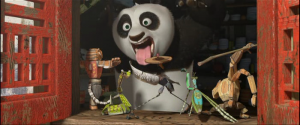 Even if the movie weren’t honed so astutely towards Po’s plight as an obese character, it offers another avenue of identification with him: in his fanatic passion for kungfu. We don’t need to have watched an action flick to know the adrenaline-laden thrills of a fight, and we all know that the heightened, expertly-placed movements are more a result of choreography than finely-honed instincts, and yet we still feel the pang in knowing that we fall short of such impossible perfection. Po’s marvelling at his encounters is thus not an alien reaction to us, and the movie forces us to be Po’s distanced companion by withholding what he (and we) desperately wants to but cannot see at an early kungfu showcase. By the time he’s spirited away to the Furious Five’s temple and left there alone, we’re complicit in his exploration of this inner sanctum, and learn from the drops of his jaw the value of the treasures we encounter within—the movie’s sneaky way of making up its own self-contained myths.
Even if the movie weren’t honed so astutely towards Po’s plight as an obese character, it offers another avenue of identification with him: in his fanatic passion for kungfu. We don’t need to have watched an action flick to know the adrenaline-laden thrills of a fight, and we all know that the heightened, expertly-placed movements are more a result of choreography than finely-honed instincts, and yet we still feel the pang in knowing that we fall short of such impossible perfection. Po’s marvelling at his encounters is thus not an alien reaction to us, and the movie forces us to be Po’s distanced companion by withholding what he (and we) desperately wants to but cannot see at an early kungfu showcase. By the time he’s spirited away to the Furious Five’s temple and left there alone, we’re complicit in his exploration of this inner sanctum, and learn from the drops of his jaw the value of the treasures we encounter within—the movie’s sneaky way of making up its own self-contained myths.
As we home in on the Furious Five, we gain the pleasure of learning how much they‘re wading neck-deep in their own mythmaking as well. Despite their grandstanding at the public ceremony where the legendary Dragon Warrior is to be chosen, once the Five have retreated to their temple they all swap jokes about the eventual pick that seem almost too puerile for such experienced fighters. Likewise, when an outsider later stumbles into one of the Five’s rooms, catching him off-guard, the warrior appears far too naked, too fatigued, too awkward, too disappointed for his supposed stature. It can be easy to understate the wisdom of Kung Fu Panda‘s choice to depict the Five as adolescents, all dramatizing to fit the myths that they’ve convinced themselves to inhabit—to be the stoic disciplined warrior, or the immovable zen master, or even just an adult—such that we have to catch ourselves from expecting the self-same illusion of them. It is to the movie’s credit that we read into the Five’s reactions not just ennobled self-righteousness, but also petulance; and when they set off on their self-assigned mission, we can sense that they’re not entirely sure of themselves, but are willing to try for what seems right. The movie shows us the age-old ideals we’ve picked up from our heroic narratives, why we love them and our impossible distance from them, and lets its youthful characters feel the weight of that gap.
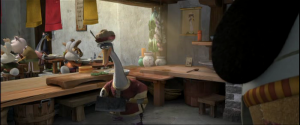 But if the movie’s youths are lost and flailing, its adults are ensconced in their wisdom, which is neither too conservative nor nonsensical for us to dismiss altogether. Po’s father is a pragmatic noodle-seller who believes that “we all have a place in this world,” and that he has inherited his. The writers give him an affecting monologue, only five minutes into the movie, about once having dreamt of running away to make tofu, and his voice actor James Hong deftly lets unease creep into the half-hearted chortles with which he dismisses his nostalgia for that dream. The writers and Hong also nail the near-callous way that he assumes the foolishness of Po’s own dreams while never seeming like an unsupportive parent—Hong bouncily inflects his natterings about noodles after Po underplays his true ambitions; and few visuals are as economical as the one in which Po embraces his father, separating to find that the latter has tied an apron around his waist. Likewise, Po’s master Shifu doesn’t know what to do with a youngster except to train their kungfu by being a mean old bastard to them, often justified in the pursuit of a Dragon Warrior status that they were never meant for. And one shouldn’t think too much about how the whole chain of events would never have begun but for the needless orchestration of Shifu’s master, Wugui, in his platitudinal attitude towards the nature of fate. Let us just say that for all Wugui’s insistence that “there is no good or bad”, he is partly responsible for the application of those labels to various characters in this tale.
But if the movie’s youths are lost and flailing, its adults are ensconced in their wisdom, which is neither too conservative nor nonsensical for us to dismiss altogether. Po’s father is a pragmatic noodle-seller who believes that “we all have a place in this world,” and that he has inherited his. The writers give him an affecting monologue, only five minutes into the movie, about once having dreamt of running away to make tofu, and his voice actor James Hong deftly lets unease creep into the half-hearted chortles with which he dismisses his nostalgia for that dream. The writers and Hong also nail the near-callous way that he assumes the foolishness of Po’s own dreams while never seeming like an unsupportive parent—Hong bouncily inflects his natterings about noodles after Po underplays his true ambitions; and few visuals are as economical as the one in which Po embraces his father, separating to find that the latter has tied an apron around his waist. Likewise, Po’s master Shifu doesn’t know what to do with a youngster except to train their kungfu by being a mean old bastard to them, often justified in the pursuit of a Dragon Warrior status that they were never meant for. And one shouldn’t think too much about how the whole chain of events would never have begun but for the needless orchestration of Shifu’s master, Wugui, in his platitudinal attitude towards the nature of fate. Let us just say that for all Wugui’s insistence that “there is no good or bad”, he is partly responsible for the application of those labels to various characters in this tale.
It’s hard to believe that an attentive viewer, however initially jaded, can hence accuse Kung Fu Panda of having no teases and rewards. Early in the movie, Shifu reveals that to become the Dragon Warrior, Po must first access a scroll suspended high from the ceiling of a massive chamber. “So how does this work, d’you have a ladder, a trampoline…?” ventures Po. Shifu laughs and replies, “You think it’s that easy, that I’m just going to hand you the secret to limitless power? One must first master the highest level of kungfu,” and of course this is a dangled promise for an upcoming action setpiece, one of the five vivid ones that we have yet to encounter at this point, that surely involves the claiming of the scroll. But the muted anticlimax of this implied thread, and how the movie later uses the setpiece instead to challenge our sentiment for the treasures Po has fawned over in it, evinces the off-kilter design that the script uses to quietly deviate from its maligned formula. That the movie doesn’t operate on wild, ambitious plot turns is no crime, not when it calibrates so perfectly its hushed surprises.
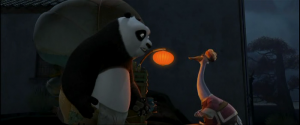 Later, another surprise involves a dejected Po admitting to his father that sometimes he can’t believe he’s his son. “Oh…” replies his father. “Po, I think it’s time I told you something I should have told you a long time ago.” We’re primed by this exchange to expect a certain answer that’s been hinted at earlier, when the panda’s father—a goose—scrolls through a hilarious sequence of portraits of his father and grandfather—also geese. But instead, Po’s father switches his revelation for a seeming nonsequitur that so neatly ties up another plot thread before cutting away, we hardly realize that he wasn’t offering a nonsequitur at all, but an oblique and far more profound answer to Po’s doubts than we might have expected. Gamely, the script takes its apparent platitude about self-confidence and flips it into an insight about how we treasure the relationships dealt to us by fate, adding a new facet to the recurring brief exchanges of who is (or is not) whose master, and making a subsequent reunion between father and son all the sweeter—but only if we are willing to sit up and look past the surface cliché.
Later, another surprise involves a dejected Po admitting to his father that sometimes he can’t believe he’s his son. “Oh…” replies his father. “Po, I think it’s time I told you something I should have told you a long time ago.” We’re primed by this exchange to expect a certain answer that’s been hinted at earlier, when the panda’s father—a goose—scrolls through a hilarious sequence of portraits of his father and grandfather—also geese. But instead, Po’s father switches his revelation for a seeming nonsequitur that so neatly ties up another plot thread before cutting away, we hardly realize that he wasn’t offering a nonsequitur at all, but an oblique and far more profound answer to Po’s doubts than we might have expected. Gamely, the script takes its apparent platitude about self-confidence and flips it into an insight about how we treasure the relationships dealt to us by fate, adding a new facet to the recurring brief exchanges of who is (or is not) whose master, and making a subsequent reunion between father and son all the sweeter—but only if we are willing to sit up and look past the surface cliché.
If we do, we’d realise how utterly generous it is for the writers to bestow the movie’s only major solo action setpiece upon the villain, slowing down his bounding up a steep rock face to telegraph his sleek grace; or another setpiece upon the Furious Five that cleverly incorporates them all even after they’ve been blindsided by their lack of importance to this narrative; and a final battle upon us that reshuffles all the pieces that came before, breathing new light into them. Nothing prepares you, either, for nifty details like the visual of a turtle unfurling from his shell to reveal that he was meditating upside down atop his wooden staff, or the hilarious sound of a collective wispy moaning when Po breaks a vase “said to contain the souls of the entire Tenshu army.” After Iron Man coasted its way to a matted robot-vs-robot anticlimax, The Dark Knight was overthrown by a winner-takes-all Joker, and WALL·E lost its way aboard the AXIOM spaceship—Kung Fu Panda has, against the odds, turned out to be the sturdiest, most perennially rewarding American blockbuster of the summer of 2008.
Kung Fu Panda | 2008 | USA | Directors: Mark Osborne, John Stevenson | Screenplay: Jonathan Aibel, Glenn Berger | Cast: Jack Black, Dustin Hoffman, Angelina Jolie, Ian McShane, Jackie Chan, Seth Rogen, Lucy Liu, David Cross, Randall Duk Kim, James Hong


I was curious if you ever considered changing the structure of your blog? Its very well written; I love what youve got to say. But maybe you could a little more in the way of content so people could connect with it better. Youve got an awful lot of text for only having 1 or two images. Maybe you could space it out better?
1